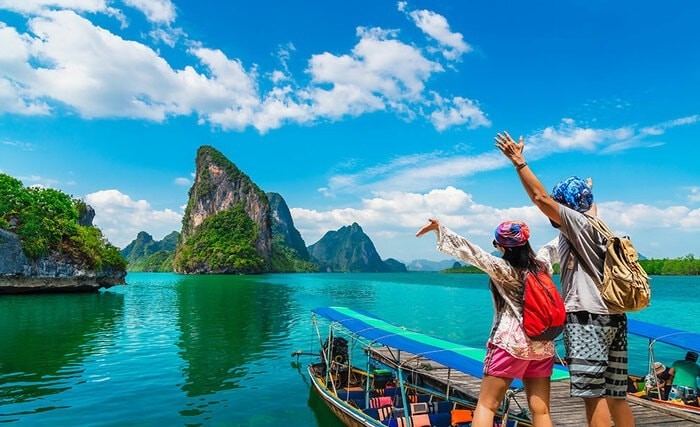
Vietnam strives to meet demand for green tourism, green experiences: Experts
Latest
 |
| Vietnam strives to meet the demand for green tourism, green experiences: In the context of increasing climate change, green and sustainable tourism is increasingly becoming a mainstream trend. (Photo: DT) |
Green tourism is an inevitable trend
According to the Vietnam National Tourism Administration, Ministry of Culture, Sports and Tourism, in the first 11 months of 2023, the country welcomed 11.2 million international visitors, 3.8 times higher than the number recorded in the same period last year and equal to 68.9% of the figure in 2019, before the eruption of COVID-19 pandemic.
In the last November alone, Vietnam welcomed over 1.23 million international tourists, an increase of 11% compared to the previous month. This is also the month welcoming the highest number of international visitors since the beginning of this year.
According to the Vietnam National Tourism Administration, Korea still maintains its position as Vietnam's largest tourism market in 11 months with 3.2 million visitors, accounting for 28.5%. The following is China and Taiwan (China). Meanwhile, Thailand, Malaysia and Cambodia as well as UK, France and Germany are the leading markets in Southeast Asia and Europe, respectively.
In particular, in November 2023, the market witnessed the strongest growth of the number of European visitors among continents, increasing by 58.5% compared to the previous month. The number of Chinese visitors continues to maintain a growth rate of nearly 10%.
The result in attracting international tourists is one of Vietnam's successes in the post COVID-19 pandemic period. However, enhancing the experience to retain tourists is not an easy task for those in the industry.
According to analysts, in the context of climate change, green and sustainable tourism is increasingly becoming a mainstream trend chosen by many people.
According to the European Commission's Report on tourist consumption behavior conducted in 2020, up to 82% of the European Union (EU) population said they could change their habits to ensure sustainability in tourism; 48% are willing to reduce waste while traveling, even accept to pay extra fees to protect the natural environment (35%) or to benefit local communities (33%).
More and more international tourists are interested in and choosing outdoor tourism activities in Vietnam such as walking, climbing, swimming to enjoy nature and improve their health, to contribute to reducing harmful impacts on natural resources.
However, talking to reporters, Dr. Jung Woo Han, Senior Program Manager, the Business School, RMIT University Vietnam, commented that foreign tourists are often concerned about the low quality of service and experience they receive during their visit, causing for low tourist retention rates.
Information from the conference "Proposals to attract international tourists" held in March this year shows that, according to statistics, the rate of international tourists returning to Vietnam is only 8-10%, a number that is too modest.
To make green development for the hotel sector
According to Dr. Jung Woo Han, what constitutes a positive experience in travel is diverse, ranging from cost to culture. More and more travelers are choosing their next destination where they can enjoy green experiences – events or emotions shaped by environmentally friendly activities.
 |
| Vietnam strives to meet the demand for green tourism, green experiences: Dr. Jung Woo Han, Senior Program Manager, the Business School, RMIT University Vietnam. (Photo: RMIT) |
This growing concern is likely to have a major impact on Vietnam's hotel industry in the future as travelers increasingly prioritize environmentally conscious choices during their stay. Therefore, it is necessary to focus on building green experiences throughout Vietnam's hotel industry and tourist attractions through appropriate green training programs.
The hospitality industry is a unique business model where both travelers (guests) and hotel staff (hosts) share a common space and experience. Once a green experience is established in a hotel, it will positively impact the experience of both guests and hosts, thereby improving productivity and customer satisfaction.
Experts from RMIT University commented: "Greening the hotel sector in Vietnam is not only a strategic decision in business and macro decisions, but also a must regarding whether we can save future generations from catastrophic floods and climate change. As it contributes 5% of CO2 emissions, the hotel industry is responsible for taking appropriate measures to prevent global warming and climate change.”
There is now a legal requirement for the hotel industry to become “greener” in business, though, for the hotel industry to bring about positive changes there is still a long way to go. Nowadays, there are hotel managers who have paid attention to shaping better green experiences, staying ahead of competitors and building a better brand image with customers and employees.
However, according to Dr. Jung Woo Han, "green" training is a long-term activity and requires focused investment and strong support from senior leaders with a long-term/strategic vision. “As domestic demand for green experiences still lags behind international tourists, hotels and restaurants targeting tourists and local customers may not easily see the potential value of investing in green training. Nevertheless, this practice also brings new opportunities for tourism human resources to become green leaders in the Vietnamese hotel industry - the path to the future," the expert said.
In Decision No. 882/QD -TTg dated July 22, 2022 on the National Action Plan on Green Growth for the 2021-2030 period, the Prime Minister assigned the Ministry of Culture, Sports and Tourism to take charge of two groups of tasks which are "Improving institutions and policies for managing tourism development towards green and sustainable growth" and "Prioritizing the development of all types of tourism towards green growth (eco-tourism, community tourism, agricultural and rural tourism, sea and island resort tourism associated with green marine economic development, adventure sports tourism ensuring green standards and criteria, etc.), develop green tourism products”.
Vietnam's tourism development strategy to 2030 also determines the development of Vietnam's tourism with a sustainable and inclusive orientation on the foundation of green growth, maximizing the contribution of tourism to the goals of sustainable development.













